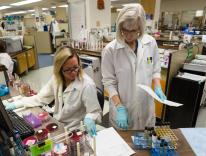Life-Saving Medicine
I would like to sincerely thank Dr. Jessica Gregg for her insightful and empathetic article (“Preventable Deaths”) in the October 2023 issue. As both a physician and the daughter of a former heroin addict, this article spoke to me on multiple levels. Throughout our training and professional careers, most physicians who are not addiction specialists take the path of least resistance in our evaluation of patients with addictions. It is often easier to turn a blind eye to the suffering; to assume the addict may not even want to get better. While I have the privilege of serving patients in a large metropolitan area where resources can be found, it is not a luxury many of my colleagues in less connected regions have. Had my father been in a rural area or small city, would he have had access to the methadone clinic that likely saved his life?
I have many happy memories of going to “The Clinic” with my dad on Saturday mornings, where he would walk in alone with his locked box, stay briefly to talk to his counselor and provider, and return with another week of medication. As a child, I had no idea of the import of this weekly occurrence; I only knew that the “medicine” kept my father healthy and that we would go to breakfast together after these appointments. It was only as an adult that I learned the truth: had it not been for the methadone clinic and the kindness and understanding of its staff, my father might not have lived long enough to see me become a doctor, walk me down the aisle, or babysit his grandchildren.
Belen Gallarza-Wilson, MD
Orange, Calif.
Netanyahu’s Hubris
Thank you for your editorial, “‘Moral Clarity’?” (November 2023). Commonweal’s voice is one of the few voices of clarity I’ve read during these dark days of death, mourning, and destruction in Israel and Gaza. Yes, a reexamination of U.S. policy toward Israel—which is, apparently, military and diplomatic support without conditions—is long overdue. That necessarily means having conditions we would invoke for any country (without vast oil reserves), including democratic norms and respect for international law. Netanyahu’s hubris, his cynical attempt to manipulate competing factions in Palestine, and his domestic political maneuverings in support of his own power at the expense of Israel’s proud tradition as a free, democratic state, are now contributing to the deaths of innocent victims on every side. It is a hubris that we have largely financed, and no American taxpayer should deny our complicity in the rubble Gaza is becoming. Innocent bystanders we are not.
Tom Crotty
Sinking Spring, Pa.
A Farm Bill for All
Yes, we absolutely need a new Farm Bill (Regina Munch, “Food Fight,” October 2023). And that bill needs to do right by the 3.2 million U.S. citizens in Puerto Rico. As a territory of the United States, Congress is allowed to discriminate against island residents in all federal social safety-net programs. Since Puerto Rico is not a state, Congress allocates a lower level of funding to administer NAP and SNAP on the island. Sens. Kirsten Gillibrand and Chuck Schumer of New York, along with Sen. Richard Blumenthal of Connecticut, have introduced “The Puerto Rican Nutrition Assistance Fairness Act” to rectify this.
Puerto Rico was part of SNAP until Congress unilaterally excluded island residents in 1981. Congress could not exclude Utah, Vermont, or Delaware from SNAP. States have rights. Territorial residents lack a voting representative in Congress and are subject to its whims.
Gene Roman
The Bronx, N.Y.
Flying Saints
Thank you for the very intriguing article “Wild Facts” by Carlos Eire (September 2023). It is very well researched and written; however, I believe it contains a serious misunderstanding of the Catholic theological tradition. Eire writes: “Charisma [is] granted to holy human beings in and through whom God worked miracles.” This is close to what most Catholics probably think, but it was not the teaching of Aquinas, for example. Aquinas distinguished two different types of graces or gifts. The charismata were gratiae gratis datae, in contradistinction to gratiae gratum faciens. This meant that charismata did not make the recipient holy or pleasing to God. The charismata were given for some purpose other than the sanctification of the recipient, such as the edification of others, and could be exercised even in the state of mortal sin. This included all the charismata listed in the New Testament writings: prophecy, the gifts of tongues, and so on. I believe even St. Paul had a dim view of many spiritual manifestations. Therefore, in spite of how ordinary people thought about charismata, theological consensus did not necessarily follow.
Secondly, I don’t see how David Hume can clarify anything. The idea that a miracle “is a violation of the laws of nature” was put to rest by Augustine centuries before Hume. Rather than a violation of the laws of nature, miracles are the result of laws we don’t understand.
Thirdly, there is always a possible gap between what people experience and what actually happens or what other people experience. I’m not sure what this does to the very notion of “credibility.”
Paul A. Hottinger
Naperville, Ill.
